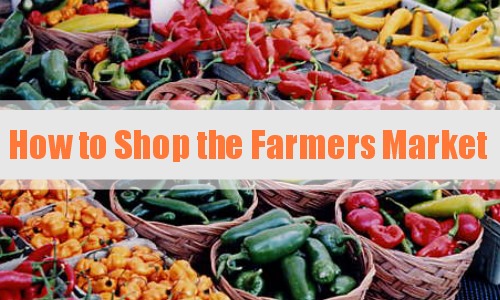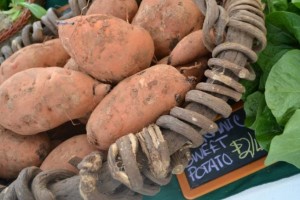This post may contain affiliate links. Read our disclosure here.

Farmers market season is here! Have you shopped your local farmers market lately? In the spring, farmers markets start popping up on Saturday mornings, offering locally grown produce, local meats, freshly baked breads, local honey, and even all-natural treats for pets. If you’re just getting started on your clean eating journey, this is a great first stop. Farmers markets can get you the best product at the best price, if you know how to shop them.
Farmer markets can be temporary, popping up on weekends during spring and summer, or they can be permanent, having a fixed location that may be open all week. The popularity of farmers markets continues to grow. In 1996, we had about 2,400 in the US. Last year, the USDA recorded over 8,100 farmers markets. Odds are, you have one nearby.
For farmers, these weekly markets are the best opportunity to sell their products directly to the consumers and make the best profit. For us, farmers markets are the best place to find the freshest locally grown produce for a great price, get to know our farmers, and learn more about the food in our area.
Find a farmers market. Use Local Harvest’s site to get a list of all the markets around you, what they offer, and their contact information. I found 16 farmers markets within 40 minutes of my home.

Learn about your market. Each farmers market is unique. Know what you’re walking into. Some farmers markets allow only local farm products: produce, meats, eggs, dairy, cheese, honey, garden plants, etc. Other markets may allow artisan products: bakery items, handmade soaps, jams, pet products, and more. And sometimes markets allow vendors to resell store-bought items.
I’m going to use my local market, the Marietta Square Farmers Market, as an example. On the market’s website, they specify the rules and regulations for all vendors. This tells me that:
All products must be grown or otherwise produced by the vendor.
Vendors intending to sell prepared and packaged food stuffs for resale must provide a copy of their current Georgia Department of Agriculture Food Sales Establishment License and must prepare the food stuffs in a Health Department / Georgia Department of Agriculture Licensed Commercial Kitchen.
Vendors who wish to sell eggs and/or dairy must provide a copy of their current Georgia Department of Agriculture certification.
Vendors must provide a list of items they intend to sell to the Market Coordinator by Wednesday at 5:00 pm of the week they will sell so the market can maintain a diverse selection of goods and to help manage supply and demand.
I know that when I buy a peach at the farmers market, I am guaranteed a peach that was grown by that farmer and not purchased at the grocery store and resold. I can also be assured that any other food products I buy are made in a facility with good health conditions.
 Learn about your vendors. On my market’s website, they provide a list of vendors. Although all these vendors won’t be there every week, this list is a great tool for researching before buying. For example, I can see the pork vendor’s contact information, look up their website and learn that their pigs are pasture ranged, forage fed, steroid-free, and antibiotic-free. I can call up the pig farm and put in a special request to pick up at the market. (I also just learned that I can order a whole hog! Time to make room in the freezer.)
Learn about your vendors. On my market’s website, they provide a list of vendors. Although all these vendors won’t be there every week, this list is a great tool for researching before buying. For example, I can see the pork vendor’s contact information, look up their website and learn that their pigs are pasture ranged, forage fed, steroid-free, and antibiotic-free. I can call up the pig farm and put in a special request to pick up at the market. (I also just learned that I can order a whole hog! Time to make room in the freezer.)
In the list of vendors, I also see that a vendor offers knife sharpening, so I can plan on bringing all my knives to sharpen while I shop. By researching your market’s vendors, you can make the most out of your trip.
Before You Shop
Farmers markets can be a lot of fun. You see lots of great vendors, delicious products, and a variety of foods you won’t easily find in the grocery store. They can also feel overwhelming and confusing. Make the most out of your farmers market trip with these tips and tricks:
Make a List. Before you leave home, make a list of what you’d like to buy, but keep it flexible. Unlike a grocery store shopping list (3 onions, bag of romaine, 2 peppers), think of general needs like “enough fruits for breakfast this week” or “veggies to snack on” or “something to serve with the roast”.
BYOB. Bring your own bags. Some vendors will provide plastic shopping bags, but it’s not the norm. I like to bring a large, sturdy tote bag and an insulated cooler bag (for eggs, cheese, yogurt, meats).
Carry cash. Many vendors at my local market now accept credit cards thanks to phone-based card swipe apps, but don’t assume all vendors take plastic. Bring cash. Small bills are especially helpful.
Keeping It Affordable
-Speaking from experience, a “quick” trip to the farmers market for the cheap $4 pastured eggs can quickly turn into an $80, 2-hour outing. How can you keep your budget in check?
-Note the price of produce/meat you buy in the store. How much per pound? Cost for organic? Know what you’re spending and if you’re getting a good price.
-Buy what you know you’ll use. Waste food = wasted money.
-Ask about bulk discounts. If the food is hearty (apples, potatoes) or can be preserved (frozen, canned, dehydrated), buying a larger quantity can save you lots of money.
-Keep it whole. To save money, focus on whole foods, not “products” like jams and baked goods.
-Keep it simple. If a regular tomato will do, skip the beautiful (and pricey) heirloom tomato.
-Stay flexible. If you wanted some broccoli but there are some gorgeous squash for half the price, switch things up!
-Shop in season. Fruits and veggies at the peak of their season will be in greater supply, often dropping the price. Don’t know what’s in season? I used Epicurious’s Seasonal Ingredient Map to see what’s in season this month for my state (Georgia): asparagus, blueberries, broccoli, lettuce, melon, okra, peaches, field peas, strawberries, and vidalia onions. It’s a pretty nifty tool.
-Shop in the rain. Bad weather means less shoppers and better prices.
-Become a regular. Getting to know the farmer and becoming a good customer often has its rewards.
-Is haggling appropriate? Some markets are haggling-friendly. Some are not. It doesn’t hurt to ask for a discount, but do so respectfully. Good etiquette suggests having exact change available, a means to carry a large order (if applicable), and to not hold up the line of other customers willing to pay full price. Use your judgement.
Other Shopping Tips
Do a lap around the market before buying anything. Check out the offerings, prices, and sales at each vendor.
Make a list of what you bought and from which vendor. If you liked the product, you know where to get it again.
Go early in the morning for the best selection, or…
Go late in the day for closeout prices.
Talk to the farmers. Ask for cooking suggestions, favorite recipes. These are the pros. They know their food.
Plan ahead….WAY ahead. Jot down when a certain fruit/vegetable first arrives in the market. Next year, you’ll know what is coming up and be able to better plan your trips.
Sign up for vendors’ email lists. They may offer special sales or benefits.
Take some time to wash and prep your purchases when you get home.
What other tips and tricks do you have for shopping at farmers markets?
My Faves
I don’t make it to the farmers market as often as I would like, but when I do go, there are a few items I always try to find.
Pastured Eggs – I can find them for $4-5 dollars per dozen at the farmers market, a savings over the $6-8 pastured eggs at Whole Foods.
Pastured Pork – The pork industry is gradually improving but pastured pork is still difficult to find in stores, let alone at a good price. When I find it, I buy it.
Greens – boxed lettuce is convenient but expensive and quick to die. I love buying greens locally because they are so much fresher, significantly tastier, and they last twice as long. (Tip: I wash and save my store-bought lettuce containers to reuse for local greens.)
Honey – raw, local honey is a delicious sweetener and may also be healing to seasonal allergy sufferers. After two years of using local raw honey, I’m allergy-free this spring. Not sure if it’s true for everyone, but I believe it’s worked for me.
Berries – like greens, store-bought berries can wither before you even make it home. I’ve found farmers market berries to have better flavor and last a lot longer. Plus, they’re easy to freeze, jam, or can!
What are your “must-get” items at your local market?
Organic vs. Local?
So, here’s the big question. Buying at a farmers market guarantees something locally-grown, but that doesn’t mean it is organically grown. Which is more important? Next week, we’ll look at the differences between local and organic produce and draw some lines to help you shop for produce locally.
This is part of an Organic Living Journey Guest Post Series now written by Mariana who has a mother’s heart and scientist’s brain.


